COP26 protesters planning high-impact disruption
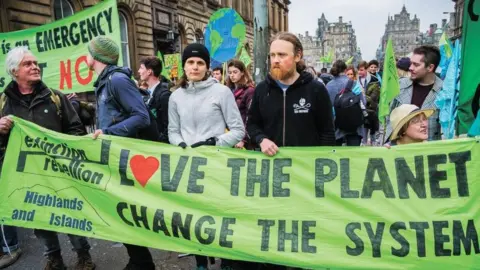 Getty Images
Getty ImagesClimate change protesters from Extinction Rebellion say they are planning high impact "deliberate disruption" during the COP26 summit.
World leaders and delegates will gather in Glasgow next week in a bid to hammer out a deal to tackle climate change.
Extinction Rebellion uses what it calls "non-violent direct action" to call on leaders to take urgent action on the climate emergency.
Its activists say they are prepared to be arrested.
But they will try not to affect the wider community by blocking routes used by emergency vehicles.
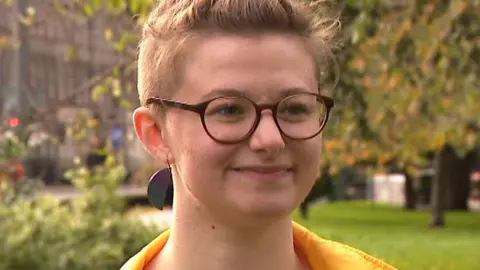
Catherine Idle, from the protest group, said: "Our approach is to have deliberate disruption where it's going to make the most impact.
"There have been 25 COPs already and emissions are still rising and so we're there to demand they do better."
Ms Idle said the activists cared about people and did not want to make going about their lives harder or more awkward.
"The disruption is to get the attention of the people with positions of power," she said.
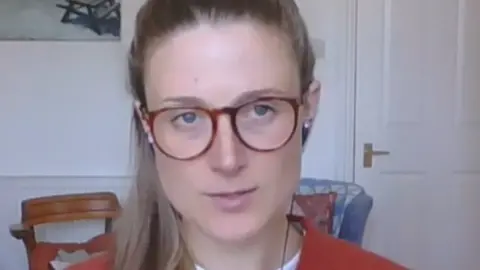
Greenpeace has been using non-violent direct action for decades. It will have representatives inside and outside the conference at Glasgow's Scottish Exhibition Campus (SEC).
The organisation's head of politics Rebecca Newsom said: "Greenpeace activists will be there on the ground in Glasgow to try to make sure world leaders actually listen and step up and take action.
"I can't go into more details about what our plans are at this stage but hopefully they will help to have a big impact and contribute to that sense of pressure that world leaders need to feel."
COP26 will attract seasoned campaigners, veteran activists and ordinary members of the public, young and old.
On Saturday 6 November, as many as 100,000 people are expected to attend a march and rally organised by the COP26 Coalition, a broad alliance of groups and individuals.
World-famous climate activist Greta Thunberg is planning to attend, as is the less well-known Malcolm Macqueen, who chairs the Organic Growers of Fairlie.
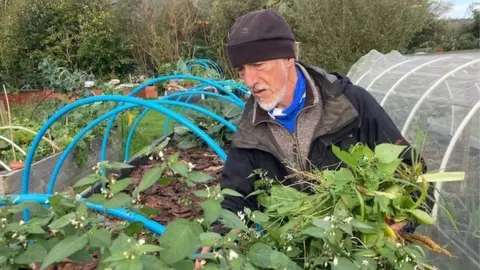
The group runs a community garden on old industrial land on the North Ayrshire coast and joined the COP26 Coalition to raise its concerns about land use and climate change.
A retired nuclear chemist, Mr Macqueen said: "I think more and more of our gardeners and across Scotland have been quite concerned this year because we had a dry spell that lasted almost two months.
"During that spell there was virtually no rain and that's likely to become the norm unfortunately.
"We want to go to Glasgow to make sure they know it's at the top of our agenda."
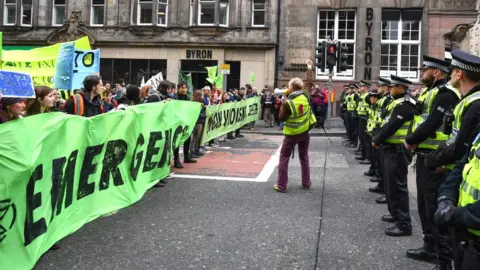 Jeff J Mitchell
Jeff J MitchellPolice Scotland will have 10,000 officers on duty every day during COP26.
The force says it will facilitate peaceful protests but won't tolerate anything that disrupts the conference or the wider community.
Hundreds of officers have received riot training in case there's trouble.
Extra cell capacity has been arranged and courts in Glasgow, Edinburgh, Aberdeen, Falkirk, Paisley and Hamilton are preparing to deal will extra cases.
It is impossible to predict how widespread or disorderly the protests will be or the impact they will have, just as it's impossible to predict how the conference will end.
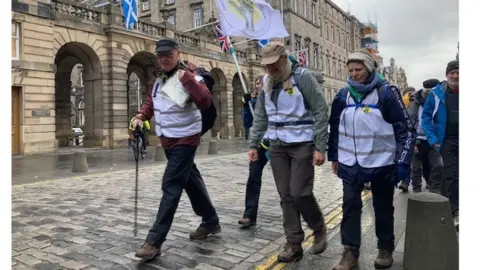
A group of 20 grandparents from Belgium travelled to Edinburgh by train and are walking to Glasgow via the Union Canal.
One of them, Ria Gielas, summed up how many people feel about COP26 and climate change.
"I do it for my grandchildren," she says. "I'm very afraid for the future because the world is going to be dangerous.
"The conference has to achieve many things. It has to be now. It has to happen now."
Insulate Britain's roadblocking tactics in the south of England have attracted widespread publicity, but proved controversial.
The group's press team told the BBC that COP conferences "are killing our kids. There are currently no plans to attend".
